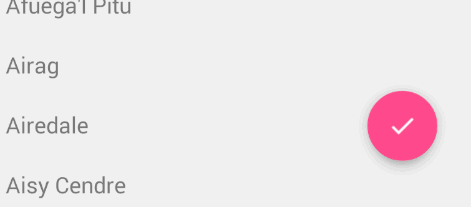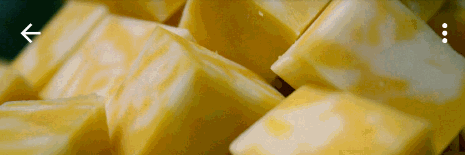英文原文:https://guides.codepath.com/android/Handling-Scrolls-with-CoordinatorLayout
这篇文章专门讲解和CoordinatorLayout相关的知识点,这也是Design Support Library中最重要与最难的部分。
概览
CoordinatorLayout 实现了多种Material Design中提到的滚动效果。目前这个框架提供了几种不用写动画代码就能工作的方法,这些效果包括:
-
让浮动操作按钮上下滑动,为Snackbar留出空间。
-
扩展或者缩小Toolbar或者头部,让主内容区域有更多的空间。
-
控制哪个view应该扩展还是收缩,以及其显示大小比例,包括视差滚动效果动画。
设置
首先确保遵循了Design Support Library的使用说明。
浮动操作按钮与Snackbar
CoordinatorLayout可以用来配合浮动操作按钮的 layout_anchor 和 layout_gravity属性创造出浮动效果,详情请参见浮动操作按钮指南。
当Snackbar在显示的时候,往往出现在屏幕的底部。为了给Snackbar留出空间,浮动操作按钮需要向上移动。
只要使用CoordinatorLayout作为基本布局,将自动产生向上移动的动画。浮动操作按钮有一个 默认的 behavior来检测Snackbar的添加并让按钮在Snackbar之上呈现上移与Snackbar等高的动画。
|
1
2
3
4
5
6
7
8
9
10
11
12
13
14
15
16
17
18
19
20
21
22
|
android:id=
"@+id/main_content"
xmlns:android=
"http://schemas.android.com/apk/res/android"
xmlns:app=
"http://schemas.android.com/apk/res-auto"
android:layout_width=
"match_parent"
android:layout_height=
"match_parent"
>
android:id=
"@+id/rvToDoList"
android:layout_width=
"match_parent"
android:layout_height=
"match_parent"
>
android:layout_width=
"wrap_content"
android:layout_height=
"wrap_content"
android:layout_gravity=
"bottom|right"
android:layout_margin=
"16dp"
android:src=
"@mipmap/ic_launcher"
app:layout_anchor=
"@id/rvToDoList"
app:layout_anchorGravity=
"bottom|right|end"
/>
|
Toolbar的扩展与收缩
首先需要确保你不是使用已经过时的ActionBar。务必遵循 使用ToolBar作为actionbar这篇文章的指南。同样,这里也需要CoordinatorLayout作为主布局容器。
|
1
2
3
4
5
6
7
8
9
10
11
12
13
14
|
xmlns:app=
"http://schemas.android.com/apk/res-auto"
android:id=
"@+id/main_content"
android:layout_width=
"match_parent"
android:layout_height=
"match_parent"
android:fitsSystemWindows=
"true"
>
android:id=
"@+id/toolbar"
android:layout_width=
"match_parent"
android:layout_height=
"?attr/actionBarSize"
app:popupTheme=
"@style/ThemeOverlay.AppCompat.Light"
/>
|
响应滚动事件
接下来,我们必须使用一个容器布局:AppBarLayout来让Toolbar响应滚动事件。
|
1
2
3
4
5
6
7
8
9
10
11
12
13
14
|
android:id=
"@+id/appbar"
android:layout_width=
"match_parent"
android:layout_height=
"@dimen/detail_backdrop_height"
android:theme=
"@style/ThemeOverlay.AppCompat.Dark.ActionBar"
android:fitsSystemWindows=
"true"
>
android:id=
"@+id/toolbar"
android:layout_width=
"match_parent"
android:layout_height=
"?attr/actionBarSize"
app:popupTheme=
"@style/ThemeOverlay.AppCompat.Light"
/>
|
注意:根据官方的谷歌文档,AppBarLayout目前必须是第一个嵌套在CoordinatorLayout里面的子view。
然后,我们需要定义AppBarLayout与滚动视图之间的联系。在RecyclerView或者任意支持嵌套滚动的view比如NestedScrollView上添加app:layout_behavior。support library包含了一个特殊的字符串资源@string/appbar_scrolling_view_behavior,它和AppBarLayout.ScrollingViewBehavior相匹配,用来通知AppBarLayout 这个特殊的view何时发生了滚动事件,这个behavior需要设置在触发事件(滚动)的view之上。
|
1
2
3
4
5
|
android:id=
"@+id/rvToDoList"
android:layout_width=
"match_parent"
android:layout_height=
"match_parent"
app:layout_behavior=
"@string/appbar_scrolling_view_behavior"
>
|
当CoordinatorLayout发现RecyclerView中定义了这个属性,它会搜索自己所包含的其他view,看看是否有view与这个behavior相关联。AppBarLayout.ScrollingViewBehavior描述了RecyclerView与AppBarLayout之间的依赖关系。RecyclerView的任意滚动事件都将触发AppBarLayout或者AppBarLayout里面view的改变。
AppBarLayout里面定义的view只要设置了app:layout_scrollFlags属性,就可以在RecyclerView滚动事件发生的时候被触发:
|
1
2
3
4
5
6
7
8
9
10
11
12
13
|
android:layout_width=
"match_parent"
android:layout_height=
"wrap_content"
android:fitsSystemWindows=
"true"
android:theme=
"@style/ThemeOverlay.AppCompat.Dark.ActionBar"
>
android:id=
"@+id/toolbar"
android:layout_width=
"match_parent"
android:layout_height=
"?attr/actionBarSize"
app:layout_scrollFlags=
"scroll|enterAlways"
/>
|
app:layout_scrollFlags属性里面必须至少启用scroll这个flag,这样这个view才会滚动出屏幕,否则它将一直固定在顶部。可以使用的其他flag有:
-
enterAlways: 一旦向上滚动这个view就可见。
-
enterAlwaysCollapsed: 顾名思义,这个flag定义的是何时进入(已经消失之后何时再次显示)。假设你定义了一个最小高度(minHeight)同时enterAlways也定义了,那么view将在到达这个最小高度的时候开始显示,并且从这个时候开始慢慢展开,当滚动到顶部的时候展开完。
-
exitUntilCollapsed: 同样顾名思义,这个flag时定义何时退出,当你定义了一个minHeight,这个view将在滚动到达这个最小高度的时候消失。
记住,要把带有scroll flag的view放在前面,这样收回的view才能让正常退出,而固定的view继续留在顶部。
此时,你应该注意到我们的Toolbar能够响应滚动事件了。
制造折叠效果
如果想制造toolbar的折叠效果,我们必须把Toolbar放在CollapsingToolbarLayout中:
|
1
2
3
4
5
6
7
8
9
10
11
12
13
14
15
16
|
android:id=
"@+id/collapsing_toolbar"
android:layout_width=
"match_parent"
android:layout_height=
"match_parent"
android:fitsSystemWindows=
"true"
app:contentScrim=
"?attr/colorPrimary"
app:expandedTitleMarginEnd=
"64dp"
app:expandedTitleMarginStart=
"48dp"
app:layout_scrollFlags=
"scroll|exitUntilCollapsed"
>
android:id=
"@+id/toolbar"
android:layout_width=
"match_parent"
android:layout_height=
"?attr/actionBarSize"
app:layout_scrollFlags=
"scroll|enterAlways"
>
|
现在效果就成了:
通常,我们我们都是设置Toolbar的title,而现在,我们需要把title设置在CollapsingToolBarLayout上,而不是Toolbar。
|
1
2
3
|
CollapsingToolbarLayout collapsingToolbar =
(CollapsingToolbarLayout) findViewById(R.id.collapsing_toolbar);
collapsingToolbar.setTitle(
"Title"
);
|
制造视差效果
CollapsingToolbarLayout还能让我们做出更高级的动画,比如在里面放一个ImageView,然后在它折叠的时候渐渐淡出。同时在用户滚动的时候title的高度也会随着改变。
为了制造出这种效果,我们添加一个定义了app:layout_collapseMode="parallax" 属性的ImageView。
|
1
2
3
4
5
6
7
8
9
10
11
12
13
14
15
16
17
18
19
20
21
22
23
24
25
|
android:id=
"@+id/collapsing_toolbar"
android:layout_width=
"match_parent"
android:layout_height=
"match_parent"
android:fitsSystemWindows=
"true"
app:contentScrim=
"?attr/colorPrimary"
app:expandedTitleMarginEnd=
"64dp"
app:expandedTitleMarginStart=
"48dp"
app:layout_scrollFlags=
"scroll|exitUntilCollapsed"
>
android:id=
"@+id/toolbar"
android:layout_width=
"match_parent"
android:layout_height=
"?attr/actionBarSize"
app:layout_scrollFlags=
"scroll|enterAlways"
>
android:src=
"@drawable/cheese_1"
app:layout_scrollFlags=
"scroll|enterAlways|enterAlwaysCollapsed"
android:layout_width=
"wrap_content"
android:layout_height=
"wrap_content"
android:scaleType=
"centerCrop"
app:layout_collapseMode=
"parallax"
android:minHeight=
"100dp"
/>
|
自定义Behavior
在CoordinatorLayout 与浮动操作按钮中我们讨论了一个自定义behavior的例子。注: 译文http://www.jcodecraeer.com/a/anzhuokaifa/androidkaifa/2015/0718/3197.html 。
CoordinatorLayout的工作原理是搜索定义了CoordinatorLayout Behavior 的子view,不管是通过在xml中使用app:layout_behavior标签还是通过在代码中对view类使用@DefaultBehavior修饰符来添加注解。当滚动发生的时候,CoordinatorLayout会尝试触发那些声明了依赖的子view。
要自己定义CoordinatorLayout Behavior,你需要实现layoutDependsOn() 和onDependentViewChanged()两个方法。比如AppBarLayout.Behavior 就定义了这两个关键方法。这个behavior用于当滚动发生的时候让AppBarLayout发生改变。
|
1
2
3
4
5
6
7
8
9
10
11
|
public boolean layoutDependsOn(CoordinatorLayout parent, View child, View dependency) {
return
dependency
instanceof
AppBarLayout;
}
public boolean onDependentViewChanged(CoordinatorLayout parent, View child, View dependency) {
// check the behavior triggered
android.support.design.widget.CoordinatorLayout.Behavior behavior = ((android.support.design.widget.CoordinatorLayout.LayoutParams) dependency.getLayoutParams()).getBehavior();
if
(behavior
instanceof
AppBarLayout.Behavior) {
// do stuff here
}
}
|
理解如何实现这些自定义behavior的最好途径是研究AppBarLayout.Behavior 和 FloatingActionButtion.Behavior。虽然这些源代码还没有放出来,但是你可以使用Android Studio 1.2集成的反编译器来查看。
参考:Android的材料设计兼容库(Design Support Library)



